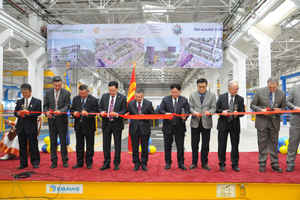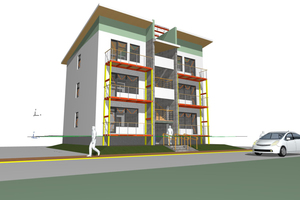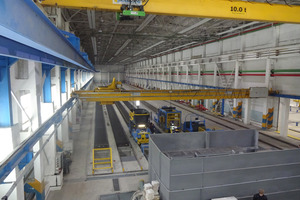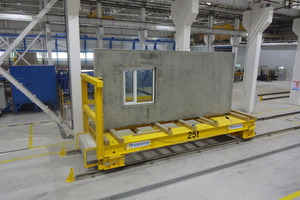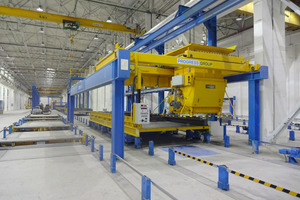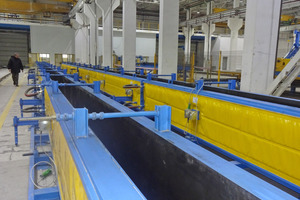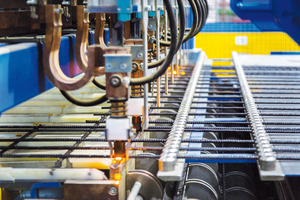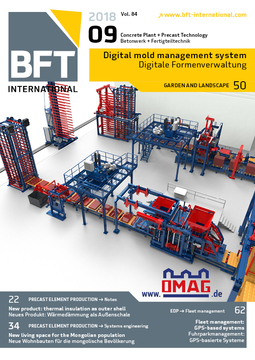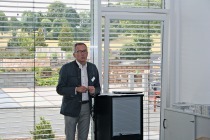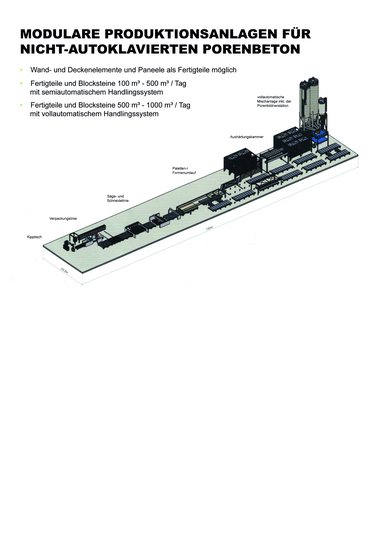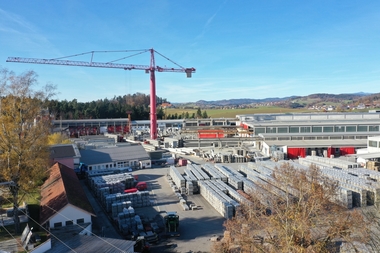New living space for the Mongolian population
The enterprise Erel Group has been investing in a precast plant near Ulan Bator for the manufacture of an exceedingly wide variety of concrete products, which will be used to erect extensive residential parks. The planning and implementation of the high-tech production plant was placed in the hands of EBAWE Anlagentechnik.
Mongolia, a land-locked state in the eastern part of Central Asia, is about four and a half times the size of Germany and has around 3m inhabitants. More than 40% of the country’s population live in the largest city, Ulan Bator, which is also its capital. Mongolia is one of ten countries in the world that are the richest in raw materials. This is why mining is the country’s most important industry. Due to the boom in this sector, Mongolia has experienced enormous economic growth in recent years. The Mongolian government has set itself the goal of providing new living space for the population. Such new districts are set to be created shortly with the investment of the Erel Group in an extensive construction project near Ulan Bator.
Extensive renovation
The Erel LLC group of companies was founded in 1989 and currently includes more than ten companies from the fields of geology, mining, building materials manufacture, building and road construction, banking, and education. The group employs an experienced team of about 1,200 people, who have made it their goal to play a leading part in the development of Mongolia. Comprehensive, integrated and innovative business solutions are offered at all levels in order to achieve this. Numerous subsidiaries have been integrated into the Erel Group over time. Amongst others, Erel owns a wood and PVC factory, a concrete plant, a brickworks, a cement plant, an asphalt plant, a crushing plant, a steel reinforced concrete plant for building and road construction, a company for property development, and the precast plant BUK-1, which was founded in 1963. Around 80% of the city of Ulan Bator was erected in the last century with precast concrete elements from this plant. For Erel, the takeover of BUK-1 marked an expansion from its original sector of geological exploration and mining. Erel then began to operate in the construction sector and has proven to be a leading company in the construction and building materials industry. The extensive plant renovation work followed in 2014.
In 2013, the versatile group of companies had already entered into a contract with the German machine and plant manufacturer EBAWE Anlagentechnik from Eilenburg near Leipzig. EBAWE belongs to the global Progress Group of companies with seven subsidiaries in four different countries. The delivery encompassed plant and machinery for the manufacture of hollow-core slabs, solid walls and ceilings, sandwich walls, interior walls, columns and beams, stairs and the reinforcements required for them.
200,000 homes planned
With the new Erel BUK-1 precast plant, Erel aims to become one of the main suppliers of concrete elements for the revitalization project in Ulan Bator and to contribute to the general development of Mongolia.
Today, over 60% of the population of Ulan Bator are assumed to reside in informal settlements, so-called “Ger” districts, which are not connected to the city’s main infrastructure. This is to change with the extensive renovation project, because the goal is to create 200,000 homes and the associated infrastructure for the urban population, such as schools, hospitals, office space, retail areas, parks and leisure areas, district heating, electricity, water, waste water and other facilities.
Production tracks for the manufacture of prestressed hollow-core slabs
For the manufacture of prestressed precast concrete elements, there are six production tracks in Ulan Bator, each 120 m long, on which a T40 slipformer runs. With this equipment from Echo Precast Engineering, also a company belonging to the Progress Group, Erel is able to manufacture 15 to 40 cm thick prestressed hollow-core slabs.
After tensioning of the wires, the fresh concrete is poured onto the production track by a concrete distributor and compacted. The cured elements are finally cut with a sawing machine, lifted up with the aid of a lifting grab and taken to the outdoor storage yard by a run-off truck. For the preparation of the next production track, a multifunctional trolley cleans and oils the shuttering surfaces in addition to pulling the wires.
Circulation technology revolutionizes production
A total of 41 pallets are available to Erel in the pallet circulation plant supplied by EBAWE Anlagentechnik. At the start of a new production cycle, the pallet passes through a cleaning unit. Adhering concrete residues are removed from the pallet surface and edge shuttering with a spatula and various brushes. Manual setting and oiling takes place after a plotter has drawn the element contours on the pallet. A comprehensive shuttering system with integrated magnets is available to the customer. The required reinforcement meshes are manufactured to the exact size and just in time on the M-System Evolution mesh welding machine. There are supplementary reinforcement machines in the form of a ladder welding machine and several welding benches with single-spot welding tongs. The complete reinforcement equipment comes from Progress Maschinen & Automation.
The concrete distributor discharges the fresh concrete onto the pallet which has been prepared with shuttering and reinforcement. The screw system guarantees an even discharge of concrete and the concrete is transported precisely out of the hopper. Throughout the weighing of the hopper, the operator is informed at all times of the quantity remaining in the hopper and can order new concrete in good time.
A combined compaction unit enables the greatest possible flexibility for various types of element. For the manufacture of sandwich walls, for example, the pallet is moved by a cross-shifter onto a buffer station, where it is fitted with insulation.
Once the second layer of reinforcement has been inserted in the form of a mesh or cage, further concrete is discharged onto the pallet. The smoothing unit with vibrating screed smoothes and compacts the concrete to the desired height level. The power trowel comes into use on expiry of the pre-curing time of one hour. This smoothes the concrete surface so finely that no subsequent reworking is necessary.
The storage and retrieval unit places the pallets with the freshly concreted elements into storage in the rack system. A total of four rack towers are available, each with twelve levels. The integrated heating optimally cures the elements so that they can be taken out of storage after eight hours. After the elements have been stripped, they are placed in an almost vertical position by the tilting unit. A mobile stair facilitates the process and the finished concrete elements can be taken by a run-off truck to the outdoor storage yard.
Molds as supplementary equipment
Two double battery molds measuring 7.50 m × 3.0 m are at the customer’s disposal for the manufacture of single-layer, untensioned concrete elements. The required reinforcement meshes are manufactured in the required size by the mesh welding machine and installed in the individual compartments of the mold.
After locking the mold, the concrete is poured into the compartments from above by a concrete distributor with a segment valve. The finely polished shuttering surfaces, vibrators on the bulkhead walls, and the steam-operated heating system guarantee perfect quality of the subsequent end products. Curing is followed by the stripping process and the elements can be transferred by crane to the run-off truck and taken to the outdoor storage yard.
The shuttering specialist Tecnocom, also a member of the Progress Group, supplied the battery molds as well as three molds for the production of columns and beams. The reinforcement is first placed inside the 48 m long molds. For this purpose, the new precast plant in Ulan Bator is equipped with an EBA S 12 automatic stirrup bending machine and a bar machining system from Progress Maschinen & Automation. Once the desired products have cured, they are also taken away by crane and run-off truck. The shuttering systems are rounded off by four stair molds.
Concrete is supplied by the completely rebuilt mixing tower with a total of three mixers, which were supplied by Wiggert & Co. The bucket track system connected to the mixing tower transports the concrete to the individual production areas. A concrete grinding machine is also available for the finishing of façade elements.
Mongolia’s first computer-controlled concrete plant
The entire plant in Ulan Bator is controlled by the ebos central control system developed by Progress Software Development. ebos handles the entire precast element production sequence and offers numerous sophisticated modules, such as 3D visualization, production feasibility tests and diagnostic programs.
Since ebos also takes care of transferring data to the relevant machines such as the concrete distributor, mesh welding machine and many more, it is much more than just a control system. It combines a large number of software sub-solutions in one program and thus allows all work processes to be executed in a single, user-friendly system. For Mongolia, such a control concept is a completely new step towards automated work sequences, computer-controlled production monitoring and, as a result, increased productivity and improved quality of the final products.
Opening ceremony ushers in a new era of precast element production
The recent opening ceremony of the Erel BUK-1 plant symbolizes the dawn of a new era in the manufacture of precast concrete elements in Mongolia. Zandaakhuu Enkhbold, head of the cabinet of the President of Mongolia, also took part in the ceremony and emphasized in his opening speech that this turning point in the building industry would from now on enable the Mongolian population to purchase inexpensive, safe and quickly assembled buildings. As a result, there will be 5,000 fewer chimneys every year in and around Ulan Bator, which will substantially reduce the smog.
Various extensive construction projects are planned for the erection of suburbs, residential buildings, social buildings and the associated infrastructure. The advantages of the building concept involving the automatic plant are obvious: The houses can be constructed in an extremely short time and equipped with special features such as a diversity of layouts, space and design. The transport of the finished concrete elements is simple and cheap, assembly is fast, and high earthquake security is also ensured. Around 250,000 m² of residential buildings, schools and other buildings are to be erected annually – the new Erel BUK-1 precast plant will thus run at full capacity right from the start.
The general director of Erel LLC, Badarchiin Erdenebat, is extremely satisfied with the implementation of the proj-ect. The new plant will be one of the largest worldwide, equipped with the latest German-made technologies, and will have a major influence on the planned renovation of the capital city of Ulan Bator. With the modernization of the works, the productivity of the plant will be increased several times over and the quality of the final products will be improved at the same time.

